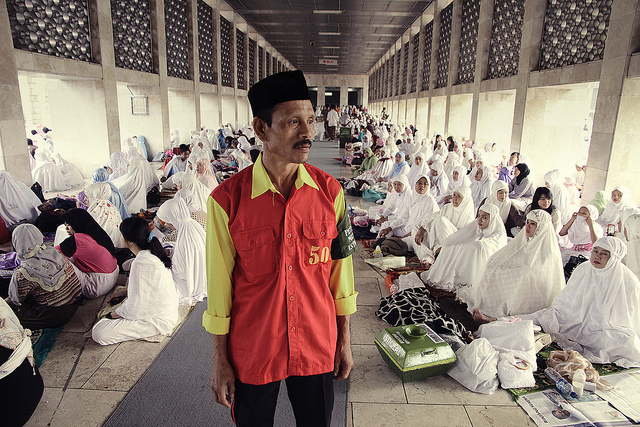A positive turn in Indonesia’s religious affairs
Posted By John McBeth on August 11, 2015 @ 06:00
 [1]Indonesia’s religious affairs minister, Lukman Hamid Saifuddin, is a breath of fresh air.
[1]Indonesia’s religious affairs minister, Lukman Hamid Saifuddin, is a breath of fresh air.
He’s a break from a long line of ineffectual predecessors who did nothing to defend minorities and showed extreme cowardice in facing up to those wanting to impose an Arabic culture on Indonesia.
A member of the sharia-based United Development Party (PPP), the 52-year-old Saifuddin is taking a nationalist approach to the religious debate, arguing that Indonesian Muslims should embrace what he calls Islam Nusantara, or Islam of the Archipelago.
In essence, he’s saying that because Indonesia is so culturally different from the cradle of Islam, the world’s largest Muslim nation should follow its own version of Islam, which emphasises moderation and tolerance, and supports indigenous cultures and the rights of women.
Saifuddin notes that because Islam came from the Middle East, there’s a widely held perception that only Middle Eastern traditions are legitimate. ‘Yet, anywhere in the world, Islamic values are based on local culture,’ he says [2]. ‘In India, Egypt, Sudan and China, for example, Islamic values are part of the local culture.’
It’s an effective defence against hardliners who claim he’s pushing deviant thought, particularly in his support of the controversial Javanese-style chanting intonation of the Koran which appears to have divided many of the country’s Islamic clergy.
What makes Saifuddin’s open-minded approach compelling is that he was educated solely in Indonesia, first at a progressive Gontor Islamic boarding school in East Java and then at the Jakarta’s As-Syafi’iyah Islamic University where he obtained his BA.
Other Gontor graduates include Hasyim Muzadi and Din Syamsuddin, former chairmen of Nahdlatul Ulama (NU) and Muhammadiyah, the country’s two largest mass Muslim organisations, and the late Muslim intellectual Nurcholish Madjid.
A three-term parliamentarian, Saifuddin is receiving powerful backing, beginning with President Joko Widodo who told a 23 July meeting of religious leaders:
This nation will only progress if it succeeds in overcoming the problems of tribalism, religion and race.
But it will take more than words. NU, which the minister is a prominent member of, is finally speaking out against the way successive governments have allowed hard-liners to slowly eat away at Indonesia’s pluralistic traditions.
NU Supreme Council chairman Mustofa Bisri told foreign journalists that with more political will, the Government could be playing a vital role in efforts to counter the influence of the Islamic State of Syria and Iraq (ISIS) and other extremist groups.
Islam Nusantara was the main theme at NU’s five-yearly congress in the Central Java city of Jombong last month. In the weeks prior to that, Bisri was among a range of senior religious figures warning of the threat to Indonesia’s inclusiveness from ignorance and poverty.
‘The benefits of tolerance must be recognised,’ Saifuddin said in a recent interview with Tempo magazine [2]. ‘The way to do it is to be more pro-active in respecting and honoring others, instead of demanding and insisting that others understand you.’
Indonesia has suffered through a long line of ineffectual religious affairs ministers. Saifuddin’s predecessor, former PPP leader Suryadarma Ali was forced to step down last year to face charges of stealing from a US$5 billion state-sponsored pilgrimage fund.
Others before him have been little more than dead wood, unable to take an objective view of issues involving other faiths and beliefs, and currying favour with the hardline clerics who have dominated the religious debate since the birth of democratisation.
Police admitted recently they were reluctant to crack down on hate speech because there were no ‘rewards’ for doing so, something that also applies to a wide range of infractions which flourish in Indonesian society because of a lack of law enforcement.
Critics say apart from fearing a backlash, police and other local officials often can’t separate their official duties from their personal beliefs, either siding with the majority or doing nothing to protect minorities.
The media hasn’t been any better.
The National Commission of Human Rights’ latest report cited 14 cases of serious religious intolerance [3] in the April–June period, including the persecution of the Ahmadiyah Muslim sect in South Jakarta, the closure of churches in Aceh and the criminalisation of Shiites in Bogor.
In his quest to make Islam more ‘friendly,’ Saifuddin has aroused controversy by questioning why all restaurants should be closed during Ramadan fasting hours and in taking aim at other dictates that have taken hold in recent years more by default than anything else.
Largely repressed for much of President Suharto’s 32-year rule, Islam has underwent a significant revival in the democratic space created after his downfall. But it has also led to a revival of extremism as well, and a worrying drift in which the mainstream majority acts like a minority.
Saifuddin argues that unlike the bloody conflicts that accompanied Islam’s spread into Europe and African, not a drop of blood was shed when it was introduced into an archipelago that had previously embraced Hindu and Buddhist values until the close of the 13th century.
That hasn’t always been the case over the past 15 years, however. Indeed, the minister knows better than anyone that new legislation seeking to promote interfaith harmony will be meaningless unless it’s accompanied by a change in mainstream attitudes, as moderate as they generally appear to be.
Article printed from The Strategist: https://www.aspistrategist.org.au
URL to article: https://www.aspistrategist.org.au/a-positive-turn-in-indonesias-religious-affairs/
URLs in this post:
[1] Image: http://www.aspistrategist.org.au/wp-content/uploads/2015/08/6321267579_54d4ef25d8_z.jpg
[2] he says: http://en.tempo.co/read/news/2015/06/16/241675583/Lukman-Hakim-Saifuddin--Tolerance-must-be-reciprocal
[3] latest report cited 14 cases of serious religious intolerance: http://thejakartaglobe.beritasatu.com/news/komnas-ham-finds-religious-freedom-still-threat/
Click here to print.